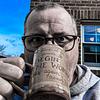Take a photo of a barcode or cover
Some great advice (or is it counsel?), great tools, and great steps to working on your personal compass to wayfair a better life. Some tools I'll certainly use at some point in the future and some exercises I want to complete.
This is a worthwhile read for anybody interested in taking an active role in designing their future.
This is a worthwhile read for anybody interested in taking an active role in designing their future.
Perhaps mis-titled; more of a "Designing Your Career" book, which I didn't actually need. Was looking for broader, more general life (re-)designing guidance, and while this book posed some helpful ways of thinking, none of the concepts revolutionized my thinking. A rather dry read, too, for something on a "squishy" topic like this.
informative
inspiring
fast-paced
Puts the design thinking methodology to creating a life you want. There’s some good nuggets about reframing and questions to ask yourself.
Some parts of this were super interesting and useful. I will be doing some of the exercises and worksheets. Other parts were boring or didn't feel like something I wanted to do. I can see why this is a well-attended class at Stamford, but I'm not sure if it has the same impact outside of a college environment where everything feels possible, you're tapped into an unlimited network, and your whole focus and all of your energy is spent on the exact point of this book- figuring out what you want your life to look like.
I think this book is probably most appealing to wealthy, highly educated, white people with a hefty savings account, who work in tech and have the means to create their dream jobs out of nowhere. If you are, say, a high school graduate living in a rural area, working at a retail store, and you have six kids, this book is unlikely to be helpful for you. I did appreciate the perspective (which I share) that there is not just one right choice for our lives and that we don't create a good life by making one choice that lasts for the rest of our lives. I like that these authors promote the idea that we should be constantly growing, assessing our satisfaction, and making changes in our lives. I also appreciate some of what I learned about design theory, including prototyping and bias to action. I still don't feel at all clear on how you'd apply this stuff to increasing your happiness in your personal relationships, or something less tangible than choosing a new career, but hey, I am a graduate of California State University, not Stanford*. Undoubtedly, someone better educated than I could figure it out.
*Take no offense, for several people I care deeply for are Stanford grads; one of them even works in tech and maybe even studied design at Stanford!
*Take no offense, for several people I care deeply for are Stanford grads; one of them even works in tech and maybe even studied design at Stanford!
4.5/5
Iterate! Be willing to let go of your first idea. Let curiosity guide and have a bias toward action
This is good, and codified a lot of ideas I had been having lately. Would recommend for anyone looking to shake things up and reimagine how their life could be. Some of the anecdotes are very funny, tok
Iterate! Be willing to let go of your first idea. Let curiosity guide and have a bias toward action
This is good, and codified a lot of ideas I had been having lately. Would recommend for anyone looking to shake things up and reimagine how their life could be. Some of the anecdotes are very funny, tok
hopeful
informative
inspiring
reflective
medium-paced
Started reading it on a borrowed e-reader, never got to continue working on it on my laptop. Found other ways to do a life audit. Will probably come back to it one day!
The positive attitude sometimes seems glib, but the book offers some tips I might actually use.





